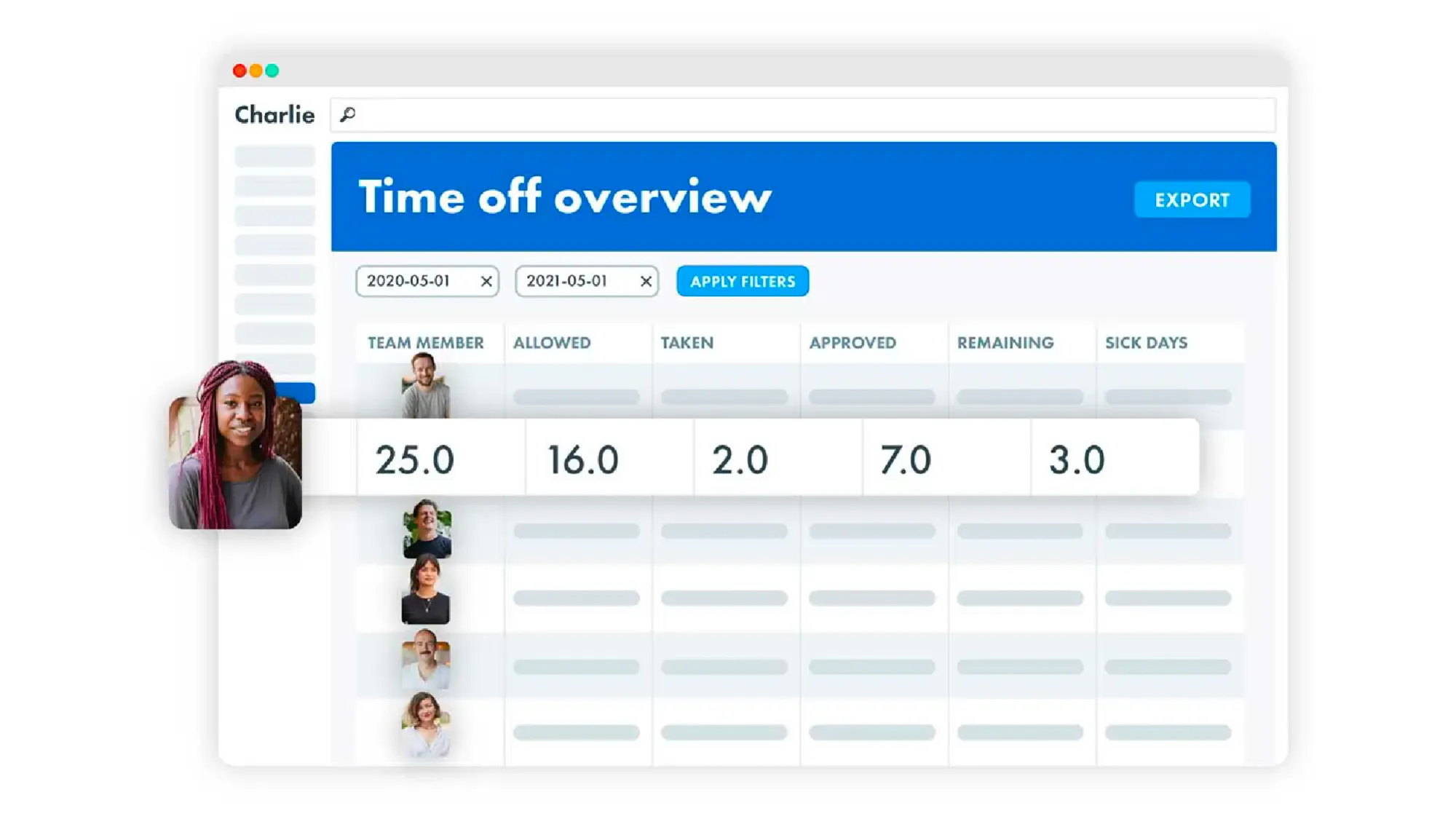Unauthorised absences from work – a step-by-step guide

What is an unauthorised absence?
An unauthorised absence (also called AWOL or absent without leave) is when an employee fails to come into work without a specific reason or without letting their line manager know.
It’s important to stress that the following types of time off can’t be considered unauthorised absences:
- Annual leave – when team members are on holiday
- Sick leave or long-term sick leave– when employees are ill and need time off work
- Maternity or paternity leave – when your staff member has had a child
- Compassionate leave – when your team member is grieving someone’s death and needs to attend a funeral
- Any other form of leave that’s authorised by your HR policies
If any of the types of leave mentioned above have been taken, it should have been done with notice and within the limits allowed by your business with approval from the employee’s line manager.
If that’s not the case, you can consider your team member’s absence as unauthorised. You might even want to think about seeing how much that accounts for with the Bradford calculator method for example.
And if you’d like to understand more about the types of leave you should offer at your company, here’s our guide on managing time off at your small business.
5 Steps to dealing with unauthorised absences at work
Contact the team member regarding their unauthorised absence
First off – your business needs to make a reasonable effort to get in contact with the employee. This might involve sending emails, slack messages, making a phone call, or (as a last resort) contacting their next of kin.
This might sound a bit invasive – but bear in mind that businesses have a duty of care to their employees. It’s relatively common for what appears to be an incident of unauthorised absence to actually be for a very legitimate reason such as:
- A health emergency – If one of your employees is in trouble, the fact that they haven’t turned up to work might be one of the earliest indicators that something is wrong – it’s essential to make a serious effort to get in touch with them or their emergency contact.
- Travel issues – it might be something as simple as a train cancelled or a car breaking down.
- A personal matter or a sick child – life is often unpredictable and a personal matter or a sick child can be disruptive to a day’s work.
Whatever the reason, team members can experience situations out of their control and miss calling into work, so don’t jump to conclusions straight away.
It’s your duty to ensure they’re ok and to understand why they haven’t been able to let you know about their absence.
At the same time, getting in touch with them in writing (via email, most likely) is an important step in dealing with unauthorised absences.
It’s good practice to inform them that their absence is unauthorised, and ask them to get in touch to explain it, in writing (an email will suffice for now) – as it will simplify things further down the line if disciplinary procedures need to be taken.
Take further action if the team member is still AWOL
If your team member hasn’t responded to your calls and various attempts to reach them, you should continue trying to get in contact with them.
At this point, email them again, informing them that the continued unauthorised absence will, without legitimate explanation, be considered a disciplinary issue.
If they don’t respond to your email, it’s time for more formal action to be taken and you can send them a letter as a written warning.
Send it and ask for a signature upon reception to make sure they’ve received the information about what’s going to happen next. Perhaps ask them to contact you within a limited time frame and outline each step of the disciplinary process that might follow if they don’t.
Please remember to use this as a warning and to not take disciplinary measures immediately as you need to give them the opportunity to provide an explanation.
There are a variety of issues that might make an unauthorised absence – while still problematic – a very different issue. Perhaps they did not explain their absence due to being uncomfortable talking about the cause – such as a sensitive medical issue, or being bullied in the workplace.
Talk to the team member if they return to work and consider your options
In cases like this, don’t be tempted to brush the issue under the rug. Set a meeting as soon as the team member returns to work to address the behaviour.
Explain that the leave was still unauthorised and therefore a problem, but reassure them that you’re not going to be heading down a disciplinary route if it’s not needed – see how you can make the employee in question more comfortable with reporting issues like this in the future.
These resolutions only work, however, in certain circumstances. You should still consider disciplinary action for unauthorised absences if:
- There is no legitimate reason for the team member to be absent from work
- You’ve already issued a warning and the team member has repeated the offense
- Your team member has been absent from work with no contact for several days
An employee failing to show up at work has a serious effect on productivity – not just because their work won’t be getting done, but through the demotivating effect, it will have on the people who work with them.
Someone simply deciding not to bother turning up to work makes everyone frustrated – understandably so – so it’s not something you can afford to take lightly.
If this situation arises, you should have already established what a disciplinary hearing will look like and the outcome for the team member.
Holding a disciplinary hearing means you might have to dismiss the team member for gross misconduct.
You’ll need to make sure you comply with UK employment law to avoid any claim of unfair dismissal if the unauthorised absences come to this.
That’s where you should maybe think about talking to HR advisors like me – to make sure you’ve given the team member enough notice to prepare for their disciplinary hearing and be 100% certain you’re doing everything by the book.
Book a call with us today to learn more about how to deal with unauthorised absences and craft HR policies for your small business or startup.
Keep tabs on unauthorised absences and time off
Unauthorised absences are unfortunate, but keeping track of time off is essential for your business. Here’s why:
- To tweak HR policies according to the patterns of absences you identify
- To catch issues early on with team members who have a lot of unauthorised absences
- To ensure you communicate to the team about what types of time off they can take
- To keep track of how much absences cost to your business
Of course, it can be difficult to manually keep track of everything within spreadsheets and drive folders.
That’s where you should think about investing in HR software and automating the whole process to manage employee absence.
With HR software, there is no need for formulas and manual reports anymore – simply get a report automatically generated through one platform and analyse it at a glance.

Launch HR initiatives to prevent unauthorised absences from your business
When unauthorised absences happen, the blame does not only lie with team members.
It’s your role to run an HR audit once you’ve analysed your time off reports to understand what you can do to clarify your HR policies, and give your team the right tools to support them.
Here are a few solutions I can recommend depending on the situation:
- Put together a strong HR absence policy – make sure everyone knows how to request time off, and how much they’re entitled to include it in their contract as well as in your policies.
- Be flexible around time off – don’t let your team members live in fear of asking for annual leave. Allow for the unexpected to happen and, if a team member has to be off but hasn’t given enough notice, ask for the reason and make exceptions. You can also think about authorised unpaid leave if needed.
- Make time off management a breeze – don’t make processes unnecessarily complicated. Invest in HR software and get your time off management process automated to allow team members to self-serve and get their requests approved or denied in one click.
- Tackle issues before they become massive problems – help team members, whatever their circumstances. This can mean taking the opportunity to offer mental health support or allowing for a salary advance if a team member is struggling financially. This can be company-wide or on a case-by-case basis depending on what you see fit.
- Have HR policies around time off, but not only – cover all the grounds from holiday rollover to parental leave, but don't forget the underlying cause of unauthorised absences such as bullying and harassment in the workplace or grievance procedures. You can also think about putting together an unlimited holiday policy.
- Work on employee engagement – this might seem like an intangible concept, but ensuring your team members are happy with their workload and the environment they work in is crucial to get high-performing teams. Perhaps run engagement surveys through an HR software like Charlie to find out how your team is doing.
- Automate time off management – invest in HR software to keep track of all types of absences from annual leave to sick leave and never miss a thing
Once all this is done, you’ve got all the steps in your pocket to understand how to deal with unauthorised absences.
And if you want to learn more about time off, perhaps have a look at our guide on average sick days in the UK.


